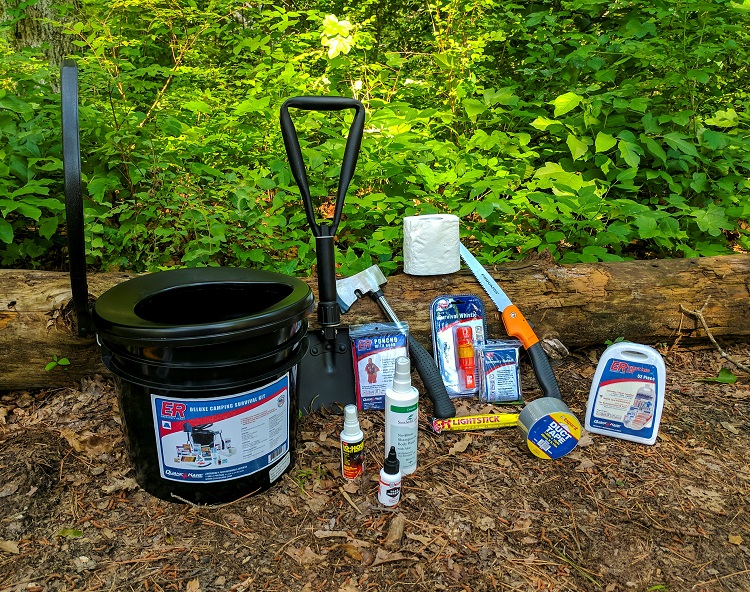Camping is fun, right? Of course! Except it might be more fun without the hassle of packing all that stuff you probably won’t need but have to drag along anyway. Just in case.
The drudgery of gathering those far-flung pieces of safety and first-aid gear make it easy to play the odds that you won’t get attacked by a swarm of mosquitos or rip your tent or have to start a fire in the rain. Lose any of those bets and camping can turn annoying, painful or downright dangerous — and leave you wishing you’d brought all that stuff. Just in case.
You can avoid the headache of gathering, be prepared for pitfalls and help a worthy cause with a Quake Kare ER Camping Survival Kit. The supplies in the kit are assembled and packed by visually impaired workers at LHB Industries, also known as Lighthouse for the Blind − St. Louis.
The camping kit is an offshoot of LHB’s Quake Kare line of emergency survival kits, which include essentials to get through the immediate aftereffects of natural and manmade disasters: earthquakes, floods, hurricanes or building collapses. The packs come in sizes to aid a single hiker in the woods, a couple forced off the road in an ice storm, a family without power overnight or a school full of children following a tornado.
The addition of a non-disaster related kit started with an idea from a pair of employees who enjoy hunting and weekends in the woods. They realized that the survival supplies could readily adapt to leisure situations in the outdoors and be marketed as a convenience item for campers, backpackers and hikers.
“We were thinking about occasional campers. Packing can be so stressful, and the whole idea of getting away is to relax,” said Brittney Bettonville, marketing manager for LHB. “This [kit] keeps a lot of the essentials together.”
Expanding to the camping and leisure market required a slight change in outlook, though.
“Camping kits differ from our other kits because campers want top-of-the-line products, not just something to get them through three days until the power is on or they can go home,” said Brian Houser, LHB’s director of sales and marketing.
Packing can be so stressful, and the whole idea of getting away is to relax
Like the company’s survival and emergency supply bundles, the camping kits are put together in a bright, airy facility in suburban St. Louis. The employees chat about the good, bad and ugly of Cardinal baseball and politics as they work their way down the line, filling each bucket with items arranged in rows of bins. For many of the visually impaired workers, being just one of the gang at the office has the power to transform lives.
“My co-workers give me the motivation to never give up despite the limitations of my eyesight. I feel like I can do anything after coming to work at the Lighthouse,” said Rita T., one of the line attendants.

Trish, a worker at Lighthouse for the Blind – St. Louis.
The building is designed to accommodate the visual challenges of the workforce, including a wide metal strip down the center of the concrete corridors, used to guide workers who require canes. Rooms on the second floor have been outfitted as a kitchen, bathroom and bedroom and are used in Lighthouse’s adaptive resources and daily living programs.
Though many of the products in the kits are made elsewhere, LHB includes several of its own, which it manufacturers at a separate facility a few miles away. Among them are the TearMender; it repairs rips in leather and fabric and can be purchased separately on Amazon and Home Shopping Network. Also included is Rapid Fix, “a super glue on steroids,” Houser said, sold through O’Reilly Auto Parts, Pep Boys and other automotive stores.
LHB’s manufacturing and assembly operations employ 48 visually impaired workers and provide $1.8 million to fund 16 programs designed to enrich the lives of people who are visually impaired and blind in the bi-state region. These include recreational camps, continuing education, and career and personal training programs.
“The camping kit is the next extension of our business, from our beginning with government contracts, though manufacturing and survival kits,” Houser said. “The more needs we can fulfill, the more visually impaired people we can employ and the more training we can offer. That’s what it’s all about.”
—————————————————
Inside the Kit
The Quake Kare ER Camping Survival Kit costs $122 and usually ships within three days. Among the essentials included are:
- A fire-starter with waterproof matches
- Mylar blankets and ponchos for inclement weather
- First-aid supplies
- Duct tape
- A fabric, leather and vinyl repair kit for tents, tarps, boots, packs and clothing
- Collapsible shovel and saw
- Basic hygiene supplies
- A toilet seat and bucket for portable sanitation
The supplies are packed in the bucket, which can be thrown into the back of a car or camper. The bucket contains extra room for additional items of your choosing. Order at quakekare.com.
Author: Kathleen Nelson is a regular contributor to Terrain Magazine


Leave A Comment